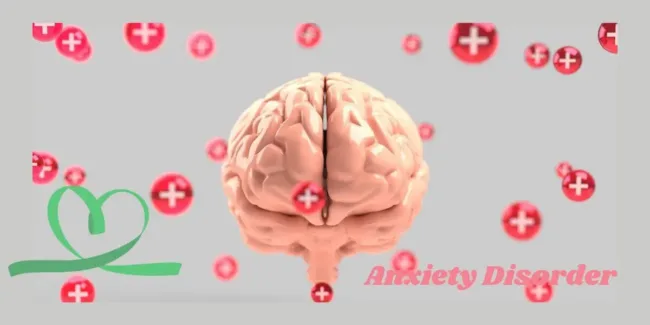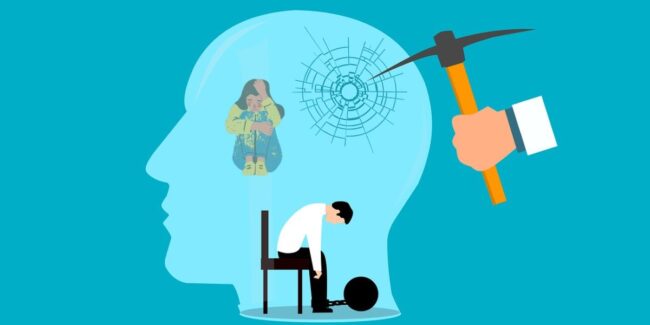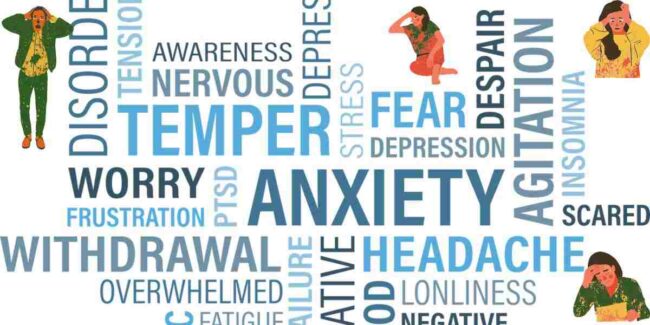Introduction:In today's fast-paced and demanding world, anxiety disorder has become an all too common issue that many individuals struggle with. Whet
Introduction:
In today’s fast-paced and demanding world, anxiety disorder has become an all too common issue that many individuals struggle with. Whether it’s triggered by work-related stress, personal relationship challenges, anxiety can significantly impact our mental, emotional, and physical well-being. If you’re seeking effective strategies to remove anxiety and regain control of your life, you’ve come to the right place. In this comprehensive article, we will delve into proven techniques that will help you overcome anxiety. It also will help you to achieve a state of peace and tranquility.
Table of Contents
Understanding Anxiety Disorder:
In the journey of finding a solution, it’s crucial to understand anxiety’s root causes and its impact on our lives. Anxiety is a natural response to stress or perceived threats. It can manifest as feelings of unease, fear, restlessness, or even panic. While occasional anxiety is normal, prolonged and excessive worry can be detrimental to our overall mental and physical health. Chronic anxiety can lead to sleep disturbances, weakened immune system, high blood pressure, and a range of other adverse effects. Acknowledging and addressing anxiety is a crucial step towards its removal.
Identifying Triggers:
The first step towards removing anxiety is to identify the triggers that contribute to your anxious thoughts and feelings. Triggers can vary greatly from person to person, so it’s important to be self-aware and introspective. Common triggers include work-related stress, financial worries, upcoming social events, health concerns, traumatic experiences, or even certain foods and substances. By recognizing and understanding these triggers, you can begin to take control of your anxiety. You also be able to devise appropriate strategies to manage and overcome it.

Cultivating Healthy Coping Mechanisms:
When it comes to anxiety removal, developing healthy coping mechanisms is imperative. Engaging in activities that promote relaxation and reduce stress can be highly effective in managing and eliminating anxiety.
Some beneficial techniques of Anxiety Disorder include:
- 1. Deep Breathing Exercises: Deep breathing techniques, such as diaphragmatic breathing, can activate the body’s relaxation response and combat anxiety. By focusing on your breath and taking slow, deep breaths, you can decrease heart rate and blood pressure, promoting a state of calmness.
- 2. Regular Exercise: Physical activity releases endorphins, also known as “feel-good” hormones, which can alleviate anxiety symptoms. Engaging in regular exercise, whether it’s through cardiovascular activities, yoga, or strength training, can significantly contribute to anxiety removal.
- 3. Mindfulness and Meditation: Practicing mindfulness and meditation can help you become more present. On the other hand, it helps less focused on anxious thoughts and worries. These techniques promote relaxation, self-acceptance, and a greater sense of mental clarity, ultimately aiding in the removal of anxiety.
- 4. Seeking Support: Mental support is very necessary in such a situation. Don’t be afraid to find support in dealing with anxiety. Whether it’s confiding in a trusted friend or family member or seeking professional help through therapy or counselling. Having a support system can provide you tremendous relief and guidance on your journey towards anxiety removal.
- 5. Prioritizing Self-Care: Self-care plays a vital role in anxiety removal. Firstly, ensure that you are getting enough sleep and eating a nutritious diet. Engaging in activities that bring you joy and fulfillment in you. Making self-care a priority will empower you to overcome anxiety and achieve an improved sense of well-being.
What is an Anxiety Disorder
Anxiety disorder is a broad category of mental health conditions characterized by excessive, persistent, and often irrational fear or worry. These feelings of anxiety can be intense and can interfere with a person’s daily life, causing distress and impairment in various aspects of functioning. Some different types of anxiety disorders include

- Generalized Anxiety Disorder (GAD): People with GAD experience excessive worry and anxiety about a wide range of everyday concerns, often without a specific trigger. This chronic worrying can lead to physical symptoms like restlessness, muscle tension, fatigue, and irritability.
- Panic Disorder: This involves recurring and unexpected panic attacks, which are sudden episodes of intense fear or discomfort. Panic attacks can lead to physical symptoms such as a racing heart, shortness of breath, and a feeling of impending doom.
- Social Anxiety Disorder (Social Phobia): People with social anxiety disorder have an intense fear of social or performance situations, fearing judgment or embarrassment. This fear can lead to avoidance of social interactions and may significantly impact their social and occupational life.
- Specific Phobias: Specific phobias are characterized by intense, irrational fears of specific objects, situations, or animals. There are some examples including fear of heights (acrophobia), spiders (arachnophobia), and flying (aviophobia).
- Obsessive-Compulsive Disorder (OCD): OCD involves the presence of obsessions (recurring, intrusive, and distressing thoughts) and compulsions (repetitive behaviors or mental acts performed to reduce anxiety or prevent a feared event). Individuals with OCD may engage in rituals or compulsive behaviors, such as handwashing or checking, to alleviate their anxiety.
Cryptocurrency: An Extensive Guide to the Future of Digital Assets
- Post-Traumatic Stress Disorder (PTSD): PTSD can develop after exposure to a traumatic event, such as combat, sexual assault, or natural disasters. It is characterized by symptoms like flashbacks, nightmares, avoidance, and hyperarousal.
- Separation Anxiety Disorder: This is more commonly observed in children and is characterized by excessive anxiety when separated from a caregiver or loved one.
- Agoraphobia: Agoraphobia involves the fear of situations or places where escape might be difficult or embarrassing. It often leads to avoidance of these situations.
The exact cause of anxiety disorders is not fully understood, but may involve a combination of genetic, environmental, and neurobiological factors. Effective treatments are available, including psychotherapy such as (cognitive-behavioural therapy), medication (such as selective serotonin reuptake inhibitors), and lifestyle changes.
In experiencing symptoms of an anxiety disorder, it’s important to seek help from a mental health professional. These conditions are treatable, and early intervention can lead to better outcomes.
Anxiety disorder treatment
Treatment for anxiety disorders typically involves with a combination of psychotherapy, medication, and lifestyle changes. The specific approach may vary depending on the type and severity of the anxiety disorder. Here are common treatment options:
Psychotherapy (Counseling):
- Cognitive Behavioral Therapy (CBT): CBT is often considered the gold standard for treating anxiety disorders. It helps to change negative thought patterns and behaviors that aid to anxiety.
- Exposure Therapy: This involves gradually and safely exposing individuals to feared objects or situations to reduce anxiety and avoidance behaviors.
- Acceptance and Commitment Therapy (ACT): ACT focuses on accepting anxious thoughts and feelings without trying to change them, and encourages individuals to commit to actions that align with their values.
Medication for Anxiety Disorder:
- Antidepressants: Selective serotonin reuptake inhibitors (SSRIs) and serotonin-norepinephrine reuptake inhibitors (SNRIs) are commonly prescribed for anxiety disorders. They can take several weeks to become effective.
- Benzodiazepines: These medications are fast-acting and can provide short-term relief from severe anxiety. However, they are usually prescribed cautiously due to the risk of dependence and withdrawal.
- Buspirone: An anti-anxiety medication that works differently from benzodiazepines and has a lower risk of dependence.
Business Insurance: Protect Your Company’s Assets
Other Medications:
- In some cases, other medications such as beta-blockers may be prescribed to help manage physical symptoms of anxiety, like rapid heart rate or trembling.
Lifestyle Changes:
- Regular Exercise: Physical activity can help reduce anxiety by releasing endorphins and improving overall well-being.
- Healthy Diet: A well-balanced diet can contribute to overall mental health. Avoiding excessive caffeine and sugar intake is particularly important.
- Adequate Sleep: Establishing a consistent sleep routine and ensuring sufficient sleep is crucial for managing anxiety.
- Stress Management Techniques: Practices such as mindfulness meditation, deep breathing exercises, and progressive muscle relaxation can help manage stress and anxiety.
Support Groups:
- Engaging with a support group helps to provide individuals with a sense of community and understanding. Sharing experiences with others facing similar challenges can be both validating and therapeutic.
Self-Help Resources:
- Books, Apps, and Online Resources: There are various self-help resources, including books, apps, and online programs, that offer information and tools for managing anxiety.
It’s important to note that the most effective treatment plan varies from person to person. A mental health professional, such as a psychiatrist, psychologist, or licensed therapist, can help assess the individual’s specific needs and tailor a treatment plan accordingly. If you or someone you know is struggling with anxiety, seeking professional help is strongly recommended for a comprehensive and personalized approach to treatment.

FAQ
Anxiety disorder test
I can provide you with a general anxiety disorder screening test, but it’s important to note that this is not a diagnostic tool. Only a qualified healthcare professional, such as a psychologist or psychiatrist, can diagnose anxiety disorders. If you suspect you have an anxiety disorder, it’s crucial to seek professional help.
Here are a few common questions that may help you assess whether you should seek professional advice:
1. Over the last six months, have you felt excessively worried or anxious about a variety of events or activities?
- Not at all
- Several days
- More than half the days
- Nearly every day
2. During this period of excessive worry, have you experienced at least three of the following symptoms more often than not?
- Restlessness or feeling on edge
- Fatigue
- Difficulty concentrating or mind going blank
- Irritability
- Muscle tension
- Sleep disturbances (difficulty falling asleep, staying asleep, or restless sleep)
3. Have these symptoms caused significant distress or impairment in social, occupational, or other areas of functioning?
4.Have you experienced sudden, intense episodes of fear or discomfort (panic attacks) that involve at least four of the following symptoms?
- Palpitations, pounding heart, or accelerated heart rate
- Sweating
- Trembling or shaking
- Sensations of shortness of breath or smothering
- Feelings of choking
- Chest pain or discomfort
- Nausea or abdominal distress
- Feeling dizzy, unsteady, lightheaded, or faint
- Fear of losing control or going sensible
- Fear of dying
- Numbness or tingling sensations
If you find that you answer “yes” to several of these questions, it’s important to consult with a mental health professional. They can provide a thorough assessment and help determine an appropriate course of action, which may include therapy, counselling, or medication.
Conclusion:
In conclusion, removing anxiety is a journey that requires self-reflection, dedication, and an arsenal of effective strategies. By understanding the root causes of anxiety, identifying triggers, and implementing healthy coping mechanisms. Here, you also can take control of your mental and emotional well-being. It is essential to keep calm in anxiety. With perseverance and the right tools, you can overcome anxiety and live a life filled with peace, resilience, and joy.

COMMENTS
[…] Anxiety Disorder: What You Should Know How to Boost Mental Health and Manage Stress? […]